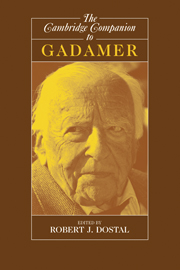Book contents
- Frontmatter
- Introduction
- 1 Gadamer
- 2 Gadamer’s Basic Understanding of Understanding
- 3 Getting it Right
- 4 Hermeneutics, Ethics, and Politics
- 5 The Doing of the Thing Itself
- 6 Gadamer on the Human Sciences
- 7 Lyric as Paradigm
- 8 Gadamer, the Hermeneutic Revolution, and Theology
- 9 Hermeneutics in Practice
- 10 Gadamer’s Hegel
- 11 Gadamer’s Relation to Heidegger and Phenomenology
- 12 The Constellation of Hermeneutics, Critical Theory, and Deconstruction
- Bibliography
- Index
2 - Gadamer’s Basic Understanding of Understanding
Published online by Cambridge University Press: 28 May 2006
- Frontmatter
- Introduction
- 1 Gadamer
- 2 Gadamer’s Basic Understanding of Understanding
- 3 Getting it Right
- 4 Hermeneutics, Ethics, and Politics
- 5 The Doing of the Thing Itself
- 6 Gadamer on the Human Sciences
- 7 Lyric as Paradigm
- 8 Gadamer, the Hermeneutic Revolution, and Theology
- 9 Hermeneutics in Practice
- 10 Gadamer’s Hegel
- 11 Gadamer’s Relation to Heidegger and Phenomenology
- 12 The Constellation of Hermeneutics, Critical Theory, and Deconstruction
- Bibliography
- Index
Summary
When presenting his own ideas or analyzing concepts, Hans-Georg Gadamer likes to follow the lead of language. The fact that the basic notions he is unfolding often have many very different meanings does not bother him. Quite on the contrary, he sees in this plurality of meaning an indication that language, long before thinking, is perhaps up to something essential. So it is with Gadamer's basic notion of understanding. This notion carries many different meanings, which nonetheless all point to one central phenomenon, i.e., the understanding that he characterizes, following Heidegger, is “the original form of the realization of our existence.” Because this is a rather vague formula, I will single out, in what follows, three different, yet very prominent connotations this notion has in Truth and Method, which all refer back to a particular origin of the hermeneutical problem of understanding, but that according to Gadamer all pertain to a central phenomenon that has to be comprehended in its unity.
- Type
- Chapter
- Information
- The Cambridge Companion to Gadamer , pp. 36 - 51Publisher: Cambridge University PressPrint publication year: 2002
- 40
- Cited by

